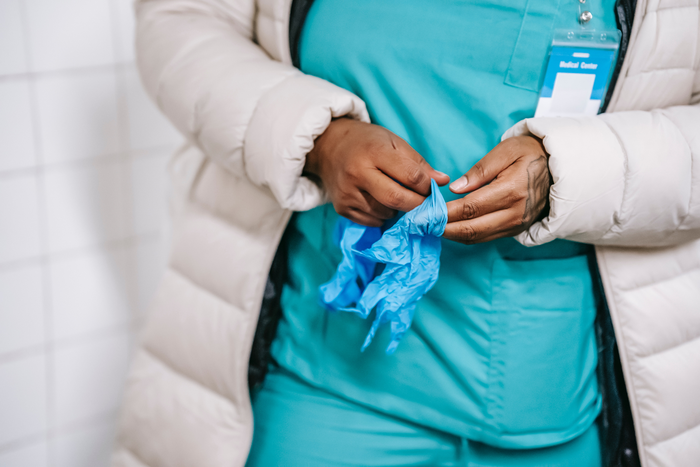Racial and ethnic minorities bore a disproportionate mental health burden during the COVID-19 pandemic, according to a new study published this week in the open-access journal PLOS ONE by Andrew Chan of Harvard Medical School, Tim Spector of King’s College London, and colleagues.

Credit: Laura James, Pexels, CC0 (https://creativecommons.org/publicdomain/zero/1.0/)
Racial and ethnic minorities bore a disproportionate mental health burden during the COVID-19 pandemic, according to a new study published this week in the open-access journal PLOS ONE by Andrew Chan of Harvard Medical School, Tim Spector of King’s College London, and colleagues.
Previous research has established that minorities have borne a disproportionate COVID-19 burden, including higher rates of infection, severe disease, hospitalization and death, when compared to non-Hispanic whites. Moreover, a three-fold increase in the incidence of depression symptoms has been reported in the wake of the pandemic. However, the effects of COVID-19 on the mental health of minorities were unclear.
In the new study, the researchers used data on 691,473 people in the U.S. and U.K. who responded to the smartphone-based COVID Symptom Study between January 23, 2021 and June 9, 2021. Participants were recruited through social media, reported baseline information and then logged daily information on symptoms and COVID-19 testing results using the Zoe app. Questions were included from the PHQ-4 (Panvalidated 4-item Patient Health Questionnaire for Depression and Anxiety), PHQ-9 and the GAD-7 (7-item General Anxiety Disorder) screening tools.
The study found that, after controlling for personal factors including prior mental health diagnoses and changes in leisure time activities, Black participants in the U.S. were 1.16 times more likely to screen positive for depression than White participants (95% CI 1.02-1.31). Compared to White participants, Hispanic participants in the U.S. were 1.23 times more likely to screen positive for depression (95% CI 1.11-1.36) and 1.23 times more likely to show signs of anxiety (95% CI 1.12-1.34). Similar results were seen for Black and Asian participants in the U.K. as well as within other subgroups of participants including Black healthcare workers, who had higher odds of depression and anxiety than White healthcare workers.
The authors conclude that minority communities in both the U.S. and U.K. have been disproportionately impacts by the mental health burden of COVID-19 and stand to suffer well beyond any presumed conclusion of the pandemic.
The authors add: “The early phase of COVID-19 pandemic was incredibly disruptive to everyday life. We found that racial and ethnic minorities in the U.S. and U.K. were more likely to screen positive for depression and anxiety. This suggests a disproportionate impact and mental health burden on persons of color, which need to be considered as we reshape health care systems to prioritize the long-term consequences of this disease.”
#####
In your coverage please use this URL to provide access to the freely available article in PLOS ONE: https://journals.plos.org/plosone/article?id=10.1371/journal.pone.0271661
Citation: Nguyen LH, Anyane-Yeboa A, Klaser K, Merino J, Drew DA, Ma W, et al. (2022) The mental health burden of racial and ethnic minorities during the COVID-19 pandemic. PLoS ONE 17(8): e0271661. https://doi.org/10.1371/journal.pone.0271661
Author Countries: U.S.A., U.K.
Funding: Zoe Global provided in kind support for all aspects of building, running, and supporting the app and service to users worldwide. LHN is supported by the NIH/NIDDK NIH K23DK125838, American Gastroenterological Association Research Scholars Award, and Crohn’s and Colitis Foundation Career Development Award and Research Fellowship Award. DAD is supported by the NIH/NIDDK K01DK120742. AAY is supported by NIH P50CA244433 and receives support from the Pfizer Medical Grants Program. LHN and DAD are supported by the American Gastroenterological Association-Takeda COVID-19 Rapid Response Research Award (AGA2021-5102). The Massachusetts Consortium on Pathogen Readiness (MassCPR) and Mark and Lisa Schwartz supported MGH investigators. ATC is the Stuart and Suzanne Steele MGH Research Scholar and Stand Up to Cancer scientist. The funders had no role in study design, data collection and analysis, decision to publish, or preparation of the manuscript.
Journal
PLoS ONE
DOI
10.1371/journal.pone.0271661
Method of Research
Survey
Subject of Research
Not applicable
Article Title
The mental health burden of racial and ethnic minorities during the COVID-19 pandemic
Article Publication Date
10-Aug-2022
COI Statement
AM, CH, SJ, SS, RD, and JW are employees of Zoe Global Ltd. TDS is a consultant to Zoe Global Ltd. DAD, SEB, and ATC previously served as investigators on a clinical trial of diet and lifestyle using a separate smartphone application that was supported by Zoe Global Ltd. This does not alter the authors’ adherence to PLOS ONE policies on sharing data and materials.




